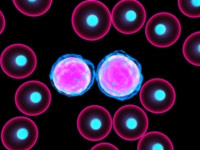Public Health
Chronic B-cell Leukemias and Agent Orange
Veterans who develop chronic B-cell leukemias and were exposed to Agent Orange or other herbicides during military service do not have to prove a connection between their disease and service to be eligible to receive VA health care and disability compensation. This includes all chronic B-cell leukemias, including, but not limited to, hairy-cell leukemias and chronic lymphocytic leukemia.
About chronic B-cell leukemias

Leukemia is a cancer of the blood cells. B-cells are a specific type of lymph cell that affect a body's immune system. There are two types of B-cell leukemia: prolymphocytic leukemia (PLL) and hairy cell leukemia (HCL).
Chronic lymphocytic leukemia is the most common form of leukemia and is characterized by the production of an excessive number of white blood cells.
Common leukemia symptoms are persistent fatigue, weakness, frequent infections, weight loss without trying; swollen lymph nodes, enlarged liver or spleen, easy bleeding or bruising, tiny red spots in the skin (petechiae), and bone pain or tenderness.
Visit MedlinePlus to learn more about chronic lymphocytic leukemia, treatment and the latest research from the National Institutes of Health.
VA benefits for chronic B-cell leukemias
Veterans with chronic B-cell leukemias who were exposed to herbicides during service may be eligible for disability compensation and health care.
Veterans who served in Vietnam, the Korean demilitarized zone or another area where Agent Orange was sprayed may be eligible for a free Agent Orange registry health exam.
Surviving spouses, dependent children and dependent parents of Veterans who were exposed to herbicides during military service and died as the result of chronic B-cell leukemias may be eligible for survivors' benefits.
Research on B-cell leukemias and herbicides
The Health and Medicine Division (HMD) (formally known as the Institute of Medicine) of the National Academy of Sciences, Engineering, and Medicine focused on chronic lymphocytic leukemia in its report "Veterans and Agent Orange: Update 2002" and concluded that there is sufficient evidence of an association between exposure to herbicides and chronic lymphocytic leukemia. In 2003, VA recognized chronic lymphocytic leukemia as related to exposure to Agent Orange or other herbicides during military service.
HMD concluded in its report "Veterans and Agent Orange: Update 2008" released July 24, 2009, that there is sufficient evidence of an association between exposure to Agent Orange and chronic lymphocytic leukemia, including hairy cell leukemia and other chronic B-cell leukemias. As a result, VA expanded chronic lymphocytic leukemia to include all chronic B-cell leukemias as related to exposure to Agent Orange or other herbicides during military service. VA's final regulation recognizing this association took effect on October 30, 2010.
View more research on health effects of Agent Orange.



















